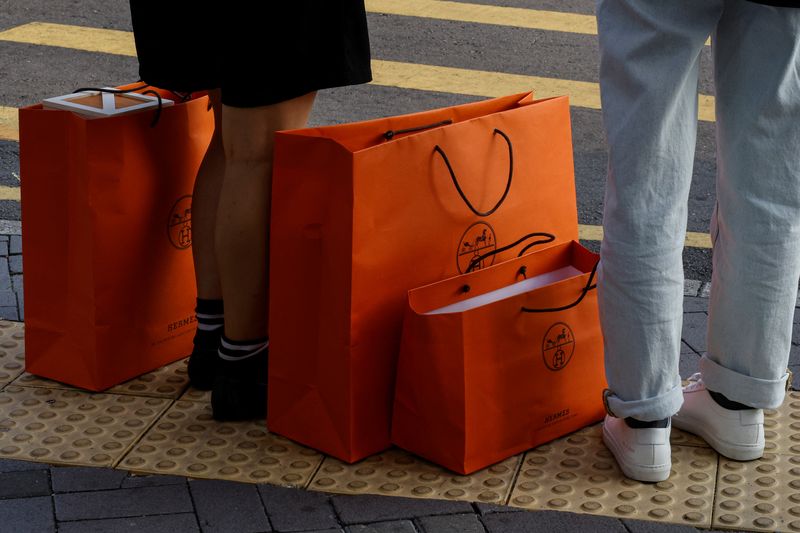By Casey Hall
SHANGHAI (Reuters) - European luxury shares have slid on investor concerns that Hermes handbags and Dior slingbacks may be Beijing's next targets for retaliation, following the EU's decision to slap tariffs on China EVs, but analysts say such a move is unlikely.
"It’s a question of how Beijing will respond to the EV tariffs. Is there going to be an escalation? I think yes. Is it going to go after luxury goods? I don’t think so," said Patrice Nordey, CEO of Shanghai-based innovation consultancy Trajectry.
So far, moves by China in the ongoing tit-for-tat trade spat with the EU have targeted brandy, pork and dairy, all of which are major industries for France, which lobbied for tariffs on Chinese-made EVs imported into the EU.
Shares of LVMH, which also markets high-end Hennessy cognac, Hermes, Kering (EPA:PRTP), Ferragamo, and Burberry dropped 2%-6% on Tuesday after Beijing said it would impose temporary anti-dumping measures on imports of brandy.
Jacques Roizen, managing director of China consulting at Digital Luxury Group, said targeting luxury goods in China would run counter to what has been consistently favourable policies for luxury firms in the world's second-largest economy, where Beijing is eager to keep more luxury spending, rather than see its consumers splurge in overseas markets.
He points to the example of Hainan, which has been built into a major duty-free hub largely due to the acknowledgement from policymakers that luxury spending in China is good for the country.
"When luxury goods sales are taking place in China, that means more tax revenue, and it's significant," he said.
"If there were a new fiscal environment that forced luxury brands to increase their price in China, it would create further incentive for Chinese consumers to make their luxury expenditures outside China, which is the opposite of what the government wants."
The size of the Chinese luxury market, even considering its recent slowdown, is expected to account for 35% of the global total this year, according to Jelena Sokolova, senior equity analyst at Morningstar.
This helps to explain the reaction of European luxury shares to every announcement that comes from China, she said, but also means that even the threat of introducing tariffs or raising domestic consumption taxes on imported luxury goods would hit French luxury conglomerates where it hurts.
French brandy shipments to China reached $1.7 billion last year and accounted for 99% of the country's imports of the spirit, while 11 billion euros ($12 billion) in European luxury goods were imported into China last year.
But the very size of the luxury goods industry might make it a less likely target for Beijing, according to Albert Hu, professor of economics at the China Europe International Business School in Shanghai.
"I think at this point, neither EU nor China wants a full- scale trade war that would hurt both economies," he said, adding that China's relatively careful orchestration of retaliatory targets thus far indicates Beijing is eager to continue negotiating and working towards a compromise with Brussels.
The nature of the luxury goods industry also makes it difficult for China to reasonably stand up claims about dumping.

"It's hard, logically, to justify that there is a case for dumping $2,000 handbags," Sokolova said.
($1 = 0.9122 euros)